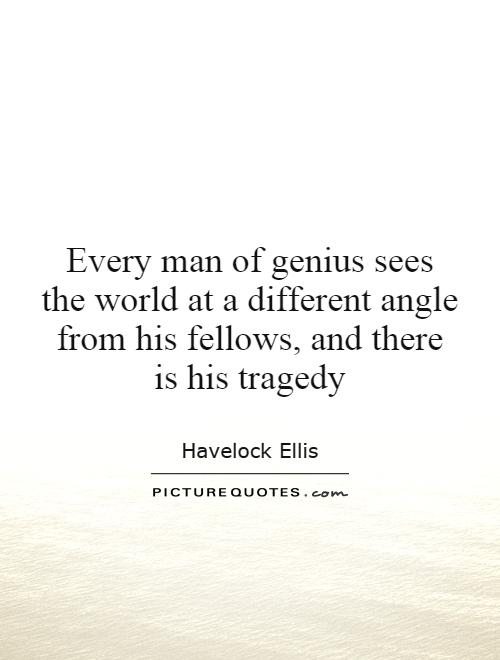Every man of genius sees the world at a different angle from his fellows, and there is his tragedy

Every man of genius sees the world at a different angle from his fellows, and there is his tragedy
Havelock Ellis, a renowned psychologist and writer, once said, "Every man of genius sees the world at a different angle from his fellows, and there is his tragedy." This statement speaks to the unique perspective that individuals of exceptional talent and intellect often possess, and the challenges that come with being different from the norm.Genius is often defined as exceptional intellectual or creative ability, and those who possess it are known for their innovative thinking and groundbreaking ideas. However, this very uniqueness can also be isolating and alienating. The genius sees the world in a way that others do not, and this can lead to feelings of loneliness and disconnect from society.
Havelock Ellis himself was a man of genius, known for his pioneering work in the field of psychology and his progressive views on sexuality. He was ahead of his time in many ways, advocating for the rights of women and the LGBTQ+ community long before it was socially acceptable to do so. Ellis's unconventional ideas and beliefs set him apart from his contemporaries, and he faced criticism and ostracism as a result.
For the genius, the tragedy lies in the struggle to be understood and accepted by those who do not share their perspective. Their ideas may be dismissed or ridiculed, their talents may be underappreciated or overlooked. This can lead to feelings of frustration, alienation, and even despair.
Despite these challenges, the genius perseveres, driven by their passion for their work and their desire to make a difference in the world. They continue to see the world in their own unique way, pushing boundaries and challenging the status quo. In doing so, they inspire others to think differently and to embrace their own individuality.












 Friendship Quotes
Friendship Quotes Love Quotes
Love Quotes Life Quotes
Life Quotes Funny Quotes
Funny Quotes Motivational Quotes
Motivational Quotes Inspirational Quotes
Inspirational Quotes